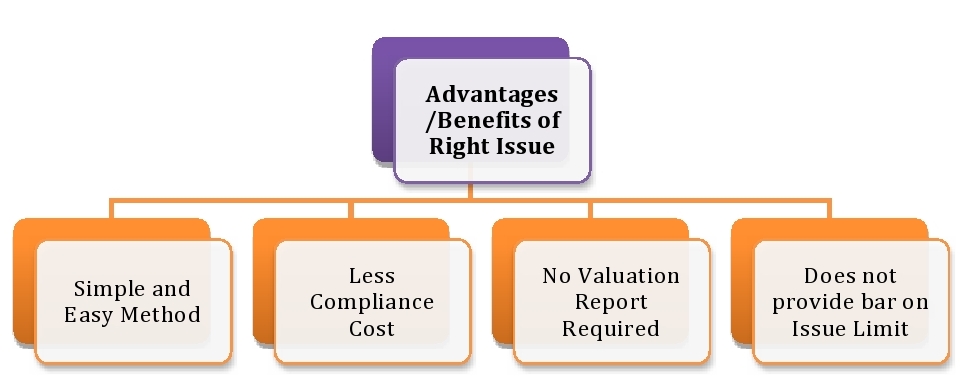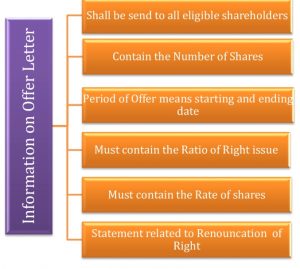RIGHT ISSUE AS PER COMPANIES ACT, 2013
One of the most popular method and less costly method to induct the further share capital in the Company is the “Right Issue” of shares. Right Issue’ means proposing shares to existing members in proportion to their existing share holding for the Consideration by the Company. Recently Reliance Industries Limited largest listed Company came up with its mega rights issue for existing shareholders to trim down the Company’s debt. Apart from the Company this right issue this offer provides an opportunity which gives shareholder to be part of the Company’s growth prospects in new and emergent domains including retail, telecom and digital avenues.
Meaning of Right Issue ::
Rights Issue is an issue of capital under Section 62 of Companies Act, 2013 and SEBI (ICDR) Regulations, 2009; wherein offer of specified securities by a listed issuer is made to the existing shareholders as on the record date. The rights are offered in a particular ratio to the number of securities held as on the record date.
GOVERNING SECTIONS AND RULES::
Issue of Share on Rights basis is covered under Section 62 of the Companies Act, 2013 and Companies (Prospectus and Allotment of Securities) Rules, 2014.
The Companies whose shares are listed on recognized Stock Exchange/Exchanges shall also follow Securities and Exchange Board of India, (Issue of Capital and Disclosure Requirements) Regulations, 2009 and the listing agreement.
Right Issue is the pre-emptive shareholders right ::
In case of right issue by the Company the existing shareholder has first and foremost right for subscrtion and It can only be offered to the outsider if the existing shareholders renounce it. Because of this, Rights issue can also be called as pre-emptive shareholders right The existing shareholders are not to be given further pre-emptive rights in respect of those unaccepted shares. Even such first right can be waived or modified.
Advantages/ Benefits of Rights Issue ::
Right issue is the win win situation for both the parties (i.e. for shareholders as well as Company) as described above in the Reliance Industries Limited case whare shareholders are getting chance to participate in Company’s growth and Company has aim to be debt free future. Right issue provides various advantage and many reasons so that companies are moving more and more towards this method for seeking to its additional financial requirement as it divergent to borrowings from banks and other financial institutions which involve a lot of formalities/ documentations and also additional interest cost. For shareholders right issue provides the additional right to participate in the Company

Restriction on Right Issue::
- No issuer shall make a Rights Issue of equity shares if it has outstanding fully or partly convertible debt instruments at the time of making Rights Issue, unless it has made reservation of equity shares of the same class in favor of the holders of such outstanding convertible debt instruments in proportion to the convertible part thereof.
- The equity shares reserved for the holders of fully or partially convertible debt instruments shall be issued at the time of conversion of such convertible debt instruments on the same terms on which the equity shares offered in the Rights Issue were offered.
Eligiblity::
Shareholders as on a particular cut-off date are eligible to participate in the Rights Issue of the Company.

Some Important Concepts and matters related to Right Issue:

Letter of Offer :: The offer of Rights Issue is made through a Letter of Offer. The Letter of Offer is filed with Registrar of Companies (ROC) and the Designated Stock Exchanges. Letter of Offer covers all the relevant information to help an investor to make an informed investment decision

Offer Period :: Offer Period: Offer to subscribe to the shares of the Company shall be open for a minimum of 15 days and a maximum of 30 days’ time period. However, in case of a Private Company, a period shorter than the 15 days may be allowed provided that the same is consented by not less than 90% of the shareholders of the Company

Renunciation of Rights:: Unless the articles of association of the Company provide otherwise, the right offered to the shareholders of the Company can be renounced in favour of any other person and the offer letter must contain a statement of this right.
There is no procedure for renunciation of offer under right issue as mandated by the provisions of the Companies Act, 2013. However, following shall be the process on the basis of ordinary prudence:
- The shareholder to whom the offer has been received shall write a letter to the Company specifying his intention to renounce the offer.
- The person in favour of whom the offer is renounced shall deliver his acceptance letter along with the share application money.
- The Company shall take note of the renunciation in the board meeting and allot the shares.
Fraction right in case of Right Issue of Shares:: Calculation of right issue Sometimes, may result in fractional right. The offer of further shares should be offered to holders of equity shares in proportion to the existing paid up capital, as nearly as circumstances admit. Thus, legally, such fractional right can be ignored. However, this becomes unfair, particularity to small shareholder.
Right Issue at Premium :: Right issue can be made at premium. There is no such restriction to issue the shares only on Par but right issue can be issued at a premium also. To describe this we are discussing the case of Green Infra limited (the assesse) w.r.t. issuance of shares at premium:
Following are the highlights of the case::
- Issue of shares at premium is a commercial decision;
- It is the choice of the Board of Directors of a Company to decide the premium amount and it is the understanding of the shareholders whether they want to subscribe to shares at such premium or not.
- The authenticity and identity of the depositor shall be established through the banking channels.
- Any receipt can be taxable under section 56(1) of Income Tax Act, 1961 only if it has some character of income.
Separate Bank Account :: There is no legal requirement of opening a separate bank account for receipt of money in case of right issue. Hence, there is no need to open a separate bank account by the Company to keep receipt of application money related to right issue.
Post Offer:: Once the offer period closes, the Board of Directors of the Company shall arrange a meeting for allotment of shares to those shareholders who have accepted the offer and to dispose-off those shares which are not accepted by the shareholders in such manner which is not dis-advantageous to the shareholders and the Company.
Valuation Report:: In general case valuation report is not mandatory for right issue but Valuation report is mandatory only in case of issue to existing non-resident shareholder .
Shareholders Approval:: No need to take approval of shareholders of the Company. Approval of Board is sufficient for right issue.
Refund of share application money :: If allotment is not made within a period of 60 days from the receipt of application money. However, there is no provision relating payment of interest @ 12% nor does it prescribe to repay within next 15 days (after the expiry of 60 days).This application money will be treated as deposit after the expiry of 60 days.
Procedure of Right Issue::
Following is the procedure of right issue for the Company::
| STEP-I | Before the calling the Board Meeting :: To decide the Cut -off dateTo prepare the draft letter of Offer. |
| STEP-II | To Call the Board Meeting:: Issuance of Notice of Board meeting along with Agenda atleast 7 days before the meeting. |
| STEP-III | To hold the Board Meeting :: Check the quorum Identify the shareholders to issue of offer letterPass the resolutionAuthorize the Director to issue the offer letterDispatch of the Offer Letter. |
| STEP-IV | To file the Form MGT-14 With ROC within 30days of passing of resolution. |
| STEP-V | To receive money from shareholders. |
| STEP-VI | After closure of offer period issuance of Notice of Board Meeting along with Agenda to Board for holding of Meeting atleast 7 days before meeting. |
| STEP-VII | Hold the Board Meeting to pass the resolution for allotment of shares. |
| STEP-VIII | Issuance of Share Certificate within 2 months of passing the resolution of allotment of shares allotment. |
| STEP-IX | To file the Form PAS-3 with ROC within 30 days of allotment of shares. |
| STEP- X | To pay the necessary stamp duty on share Certificates. |
Some more Rights Issue Conditions and Compliances for the Listed Companies::
There are certain conditions as per SEBI Regulation, 2009 for right issue these are as follows:
- If the value of securities exceeds 50 Lacs, listed issuer could not use Rights issue unless he informs the SEBI, by filing the offer letter draft via Merchant banker prior to 30 days of filing it with selected Stock exchange.
In case, where securities aggregate value is not more than 50 lacs then the company will follow the guidelines of SEBI regulation 2009 to draft an offer letter and inform SEBI too by filing the same.
- After receiving the in-principal approval of the stock exchanges where the issuer company wishes to list the securities, SEBI observations may be issued.
- If the security had been converted in to Equity share than the issuer company cannot exercise on equity shares, Rights Issue, unless the those partly paid-up shares are forfeited or paid fully.
- The issuer company can only exercise Right Issue of the shares if the 75% of finance arrangements, other than those proposed to be raised by Rights Issue, are made and verified.
- In the letter of offer filed with the Security Exchange Board of India may not have the price band or issue price disclosed. It can be determined before the record date fixation after consulting with selected stock exchange.
- An issuer Company has to make agreement with Merchant Bank through MOU specifying issues relating to mutual obligations, liabilities and rights, before issuing of security via Rights Issue.
- An abridged offer letter is dispatched, by the Lead Merchant Banker, to shareholders in 3 days advance at least, of the issue opening.
- However, it can also make the offer letter available to any shareholder who has made specific request for it.
- Issuer Company has to admit to fully pay or forfeit the offered securities, through present or upcoming Rights Issue, within a span of 12 months from Allotment date.
- Once the offer letter for Rights Issue is submitted with SEBI by the company thenadditional issue of capital cannot be made by company till the preferred securities have either been listed or in case of non-listing refunds the application money.
- The Merchant Banker releases an advertisement, mentioning the completion date of offer letters dispatch, in regional language newspaper at the company’s registered office, in at least one English newspaper, or one Hindi news paper , 3 days prior to opening issue.
- Once the announcement of the Rights Issue is made then it cannot be withdrawn by the company.
- If the issuer company has withdrawn it after its record Date announcement, then it cannot make another application for next 12 months from the date recorded.
- Rights Issue has to be kept open for maximum of 30 days and minimum of 15 days.
- If 90% of minimum issue subscription is not received by the issuer company than it shall refund the entire subscription within 15 days of the issue closure.
- If the issuer company failed to pay the amount within prescribed period then an additional 15% per annum interest will be charged till it is paid.
- The collected funds can only be utilised only after the allotment is completed.
Compliances Related to Non- Resident Shareholders::
Equity shares to non-resident shareholders including additional rights equity shares. Further, as per the Master Direction on Foreign Investment in India dated 4th January, 2018 issued by the RBI, non-residents may, amongst other things can::
- subscribe for additional shares over and above their Rights Entitlements;
- renounce the shares offered to them either in full or part thereof in favour of a person named by them; or
- apply for the shares renounced in their favour.
- Applications received from NRIs and non-residents for allotment of Rights Equity Shares shall be, amongst other things, subject to the conditions imposed from time to time by the RBI under FEMA in the matter of Application, refund of Application Money, Allotment of Rights Equity Shares and issue of Rights Entitlement Letters/ letters of Allotment/Allotment advice.
Conclusion ::
Hence we can say this that the right issue is the simplest and less time consuming process for the Company. Right issue provides shareholders also the right to participate in the Company’s capital requirement.
==============================
DECLARATION
I, Tanu Tyagi D/o Mr. Ramkumar Tyagi having my office at first floor, House No. 970, Sector-21D, Faridabad, hereby declare that the article, “ Right Issue as per Companies Act, 2013” has been written by me on the basis of legal facts and contents have not been copied from anywhere except legal provisions under various enactments.

PCS Tanu Tyagi (Practising Company Secretary)
ACS, B.Com, LLB
Right Issue as per Companies Act, 2013
Email: geegeecorplegal@yahoo.in
Website: www.geegeecorplegal.com
